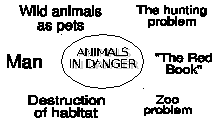Цели урока:
1. Практическая: научить учащихся высказывать свое мнение по теме урока.
2. Развивающая: развивать навыки коммуникативной компетенции в монологической и диалогической речи, аудировании и чтении.
3. Образовательная: активизировать употребление лексических единиц по теме, расширить знания относительно грамматического материала урока «Согласование времен».
4. Воспитательная: прививать любовь к животным, способствовать ознакомлению с иноязычной культурой и расширению кругозора учащихся.
Оснащение урока:
Оформленная доска, раздаточный материал, интерактивная доска.
ХОД УРОКА
1. Организационный момент:
Цель: сообщить учащимся тему и цель урока, подключая их к диалогу
T. : Good - morning, children! I’m glad to see to you! At this lesson we shall continue the theme “Environmental protection” and we shall speak about wild animals which are in danger. During the lesson you will answer such questions as:
- How can we safe them?
- What must we do for it?
At this lesson we shall speak about the reasons of disappearing and endangerment of wildlife.
2. Языковая зарядка:
Цель: настроить речевой аппарат учащихся на урок английского языка
T: But firstly let’s remember the common words according the this theme (учащиеся составляют словосочетания):
Giant Whale
Blue Snapping Turtle
Alligator Panda
African Parrot
Green - cheeked Elephant
Mako Shark
So, today we shall speak about animals which are in danger.
Основная часть
Look, please, at our board, we have here only the problem and now we shall try to determine the reasons of appearing this problem.
- How do you think, who or what can be the first reason?
Look, please, at the board and you’ll see that in this task we don’t have words and sentences, share these letters into words and sentences and you will have the first reason of our today’s theme.
Task: Alotofspecies – fishreptilesinsectsbirdsmammals – maydiebeforeyouhavechildren Thereasonis Manthatkillsanimalsanddestroystheirhabitats
Answer: A lot of species – fish, reptiles, insects, birds, mammals – may die before you have children. The reason is Man that kills animals and destroys their habitats.
You are right, MAN is the first and the main dangerous risk for wildlife and animals in general.
T: Children, let’s read the text from your books and we’ll find out the next reason why animals can be in danger. Open your workbooks on P. 61 – Ex. 13 (Чтение одной части и соотношение ее с А - С)
- What is your personal opinion about keeping wild animals as pets? (анализ текста)
- As for me…
- I think that…
- As my mind…
- I don’t agree…
- I must agree that…
- You are quite right…
- On the one hand it is…, but on the other hand…
T: But sometimes people keep wild animals as pets. Children, what wild animals do you know in this role? Name them: rabbits, pythons, chimpanzees…
We have two reasons of all problems of wild animals: MAN, PETS.
- Think, please, what reason can we add here more? I’ll help you. When wild animals don’t have an opportunity to live in their habitat where can we meet them?
- At the zoo.
- Have you ever visited the zoo? Did you like there? (ответы учащихся)
- Some people say that animals should not be kept in zoos. Do you agree with this opinion? Do we need zoos? (ответы учащихся)
- Pupils, look at the table. Firstly, choose only phrases which we can use for the using the zoo. Then against.
Task:
- Animals in zoos are safe from hunters
- It’s cruel to take away an animal’s freedom
- Zoos can be unhealthy places for animals
- Often kept alone in small cages, can’t move freely
- Many become so bored & unhappy that they die
- Species which can't survive in wild can be bred in captivity
- Feeding animals at the zoo
T: I think it’s very difficult to live at the zoo, especially if mothers - animals can’t live with their children, let’s connect them. There are the names of baby - animals before you and some of you have the names of adults. Stand up and find these pairs now.
Pairs:
parents – infants
cat – kitty
dog – puppy
sheep – lamb
hen – chicken
duck – duckling
goat – kid
Учащиеся ищут свои пары.
T: I think that may be all of you have pets at home. I believe that they are not unusual pets. Now you have pairs, I offer you to make up dialogues about your opinion to having pets.
Examples of dialogues:
- Do you have/ like pets?
- Yes, I do.
- What is your pet?
- He/ She is…
- How do you take care of him/ her?
- I look after my. . . I give him/ her love and protection. …
T: You have made up very emotional dialogues. Everybody, stand up, please, let’s make a circle, touch hand of your neighbour and smile to each other. I wish that your love will be not only for your pets but also for your classmates, relatives, and friends.
Take your sits. Children look what I have. It’s a letter, here it’s a text about African Elephant. Here is also a task to this text, listening to this information and find/ choose the most suitable paragraphs after the text
Весь материал – смотрите документ.

 Получите свидетельство
Получите свидетельство Вход
Вход












 Урок английского языка «Environmental protection» (71 КB)
Урок английского языка «Environmental protection» (71 КB)
 0
0 793
793 11
11 Нравится
0
Нравится
0







